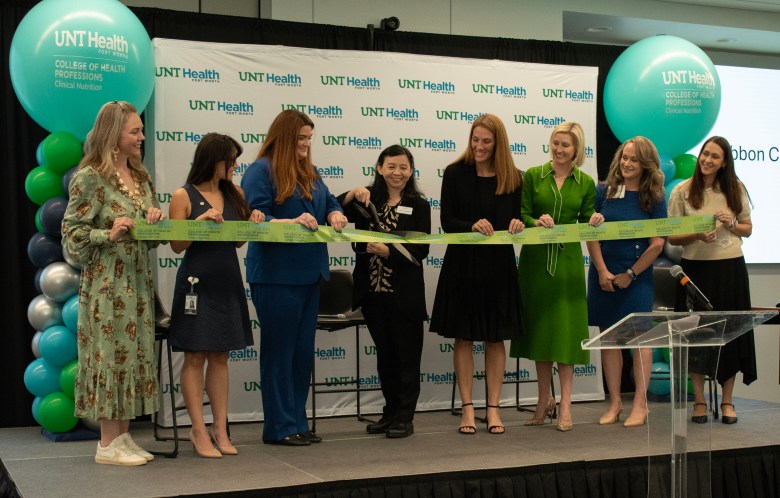UNT Health Fort Worth will train a new class of registered dietitian nutritionists next fall with the start of a master’s degree program in clinical nutrition.
The new program is designed to fill a growing need for registered dietitian nutritionists as the medical profession and communities increasingly recognize the role nutrition plays in health care. Registered dietitian nutritionists are professionals who evaluate nutritional needs to help people live healthier lives.
“I think it’s just so pivotal to so many different health conditions, and I don’t know that it’s always kind of thought of as maybe the first line of defense is going to see a dietitian when someone’s diagnosed with maybe high blood sugar, prediabetes, things like that, to help really delay or stop the progression of disease,” UNT Health professor Jennifer Mills said.
The full-time, 22-month program will include online instruction and practical experience from 28 weeks of supervised rotations and two weeks at UNT Health’s Regional Simulation Center.
A growing older adult population, many of whom have chronic diseases, is also propelling a need for dietitian nutritionists, clinical nutrition program director Christina Liew-Newville said.
“People that are getting older, they want to retire and feel good and able to travel and able to do stuff that they waited all their life to do, so they’re also seeking that help,” she said.
 Clinical nutrition program director Christina Liew-Newville, center, cuts the ribbon at the UNT Health clinical nutrition kickoff event, surrounded by other involved UNT Health Fort Worth employees and Fort Worth City Council member Macy Hill. (McKinnon Rice | Fort Worth Report)
Clinical nutrition program director Christina Liew-Newville, center, cuts the ribbon at the UNT Health clinical nutrition kickoff event, surrounded by other involved UNT Health Fort Worth employees and Fort Worth City Council member Macy Hill. (McKinnon Rice | Fort Worth Report)
UNT Health held a kickoff event for the program on Oct. 2. Fort Worth City Council member Macy Hill highlighted the program’s alignment with a new Texas law requiring graduate health care schools to add nutrition instruction to existing programs.
Texas is second in the nation for employment of dietitians and nutritionists, according to the U.S. Bureau of Labor Statistics. The Dallas-Fort Worth area is also ranked sixth in the country for employment in the field, higher than anywhere else in the state.
The clinical nutrition program was granted accreditation candidacy from the Accreditation Council for Education in Nutrition and Dietetics in July, allowing the program to begin marketing and recruiting. If all goes well, the program will be fully accredited in a few years, and the candidacy status in the meantime allows graduates to sit for the registered dietitian nutritionist exam.
The program opened applications at the beginning of August and has already garnered three applicants, with more expected before the Feb. 1 deadline, Liew-Newville said.
She hopes the program meets its goal of leaving graduates not just with the skills they need to be registered dietitian nutritionists, but also knowing how to collaborate with other professions and generate change.
“We are hoping that these students that we build, that will graduate in the future, will really become a key player and leaders in our community,” she said.
McKinnon Rice is the higher education reporter for the Fort Worth Report. Contact her at mckinnon.rice@fortworthreport.org.
The Fort Worth Report partners with Open Campus on higher education coverage.
At the Fort Worth Report, news decisions are made independently of our board members and financial supporters. Read more about our editorial independence policy here.
Related
Fort Worth Report is certified by the Journalism Trust Initiative for adhering to standards for ethical journalism.
Republish This Story
Republishing is free for noncommercial entities. Commercial entities are prohibited without a licensing agreement. Contact us for details.
